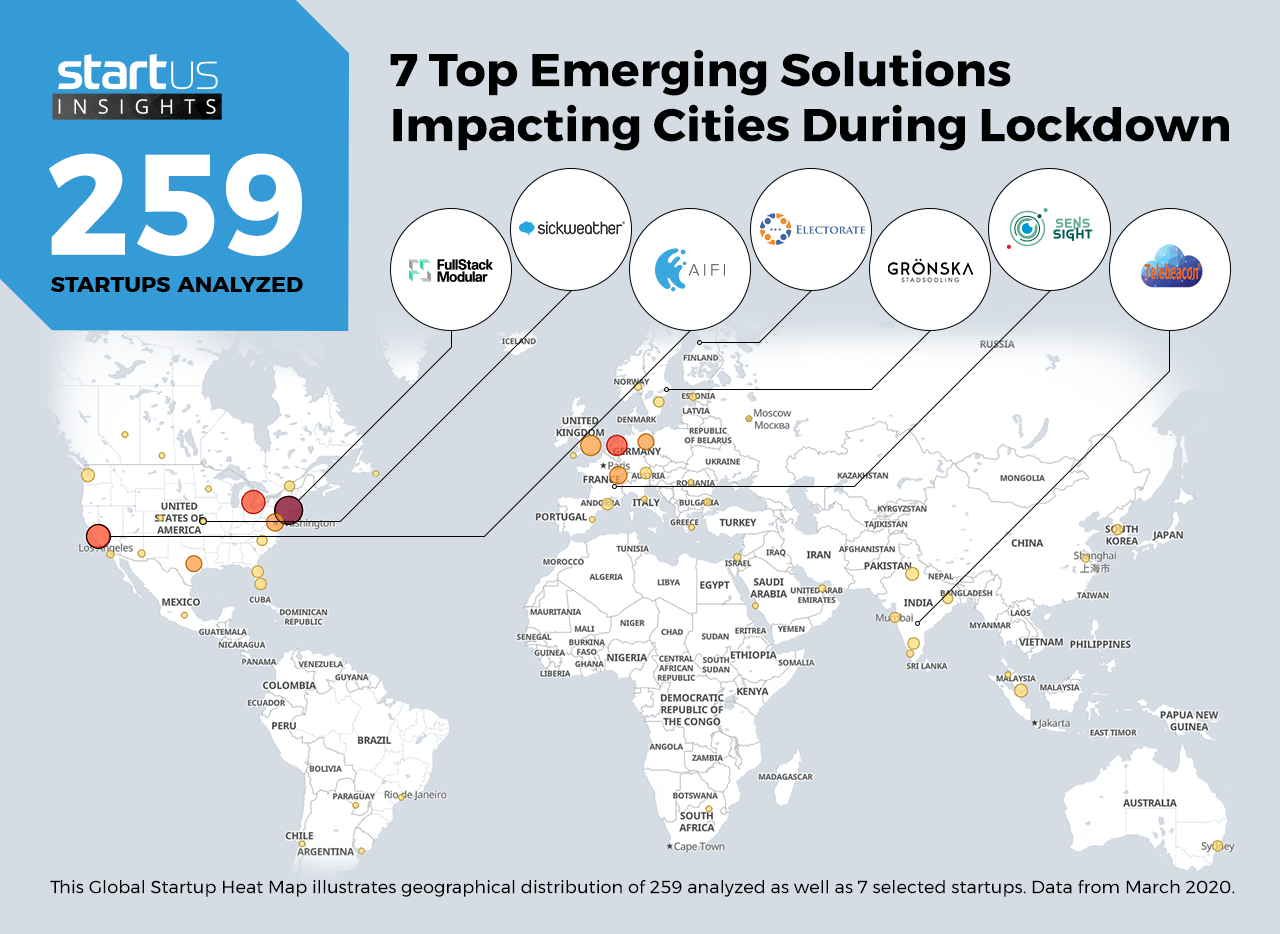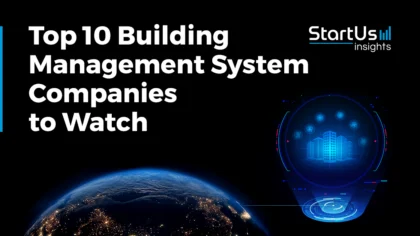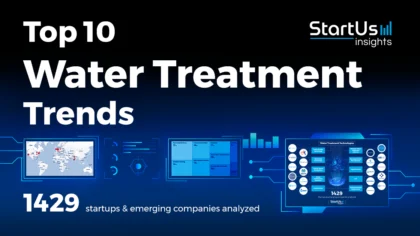Our Innovation Analysts recently looked into emerging technologies and up-and-coming startups working on solutions that help cities adapt to the coronavirus lockdown.
Heat Map: 7 Top Emerging Solutions Impacting Cities During A Pandemic Lockdown
We use a data-driven startup scouting approach to identify the most relevant solutions globally. The Global Startup Heat Map below highlights 7 interesting examples out of 259 relevant solutions. We analyzed technology-driven solutions that help cities and towns adapt to the COVID-19 induced lockdown. Senssight, Telebeacon, Electorate, GRONSKA, AiFi, FullStack Modular, and Sickweather develop 7 top solutions to watch out for.
FullStack Modular – Prefabricated & Modular Construction
When dangerous viruses spread rapidly, city authorities have to be ready to construct new hospitals, shelters or infrastructure objects much faster. Thanks to prefabricated, preassembled, modular, and off-site construction practices, cities save a lot of time in setting up essential and temporary infrastructure. In addition, the manufacturing takes place away from the location site of the building, decreasing dependence on weather conditions. Moreover, such solutions require a lower number of workers to safely continue construction away from big cities, thereby increasing public safety.
The US-based startup FullStack Modular applies lean design-to-build processes and off-site modular construction techniques to increase control, predictability, and speed-to-market of the process, with fewer onsite workers. FullStack Modular’s approach allows acting rapidly when the demand for new shelters and buildings in cities arises amidst crisis times.
Sickweather – Sickness Mapping
Generally, it is essential for cities to stay well-informed about the status of any diseases occurring in it, from the seasonal flu to the coronavirus pandemic. Cities apply continuous monitoring & verification algorithms collected from various sources by employing sensors. In sum, the data from these sensors provides extract localized insights to map the spread of diseases, develop protection strategies and prompt citizens to take required actions.
The US-based company Sickweather combines patented social media monitoring algorithms, crowdsourcing data, and third-party sales, demographic, and clinical information to create real-time health maps for any region. Sickweather’s engine is capable of predicting outbreaks of the seasonal flu and similar illnesses in advance, as well as informing individuals and authorities about high-risk zones.
AiFi – Autonomous Stores
During pandemics, cities need to motivate their residents to shop by exercising as much social distancing as possible. Autonomous stores usually employ the power of Artificial Intelligence (AI), human action recognition, QR or RFID codes, smart cameras and sensors, intelligent shelves and labels, as well as self-checkout for customers. This technology allows for cashier-less settlements, improves user experience, and eliminates queues, thus, enabling less human interaction during epidemics.
The US-based startup AiFi develops NanoStore, an automated modular checkout-free shop that requires no staff and operates around-the-clock. The solution incorporates edge computing, scalable sensor fusion, computer vision, and smart payments to enhance customer experience, as well as guarantee no people in lines and delays.
Electorate – Online Civic Services
With the rise of GovTech, numerous novel and simple solutions for cities to better engage with their citizens exist. Moreover, the importance of online civic service technologies increases during the COVID-19 pandemic. Powered by e-services, online voting, and digital community debates, the technologies aim to uphold a constant chain of communication between government and communities during crisis time, or even otherwise.
Finnish startup Electorate works to foster participatory democracy in cities and municipalities. Their solution encourages a transparent and digitized relationship between individuals and city councils. In addition, the solution gamifies civic feedback and debates to enable informed decision-making from the comfort of a citizen’s home.
GRONSKA – Indoor Farming
Despite being on lockdown, citizens need access to regular and healthy food supplies. Vertical farms, aquaponics, and contemporary sustainable agriculture practices such as urban indoor farming, allow for growing and distributing eco-friendly fruits, vegetables, and groceries from inside cities. Besides saving a lot of space that is usually required for agriculture, this also contributes to an increase in the number of small urban nurseries that crop up all over a city.
Swedish startup GRONSKA utilizes climate-independent vertical farming techniques and hydroponic water management to ensure sustainable indoor production of vegetables. This eliminates the issues associated with pesticides and deforestation. GRONSKA grows and delivers vegetables and herbs over Stockholm year-round.
Senssight – Smart Surveillance
To halt the spread of dangerous pandemics, urban inhabitants have to follow country- and city-wide social distancing regulations. Today, cities utilize smart surveillance systems that benefit from the power of the internet of things (IoT), AI, and real-time video analytics to monitor patterns and anomalies in human behavior. Furthermore, they assist in detecting and punishing individuals who routinely ignore rules, especially during a quarantine.
French startup Senssight designs and develops complex surveillance systems that combine infrared camera hardware with powerful thermal vision algorithms. The solution recognizes and counts people in queues, shops, and public places to identify any trends and violations, in addition to providing real-time data and analysis.
Telebeacon – Location-Based Systems
When the number of confirmed infection cases accelerates, cities have to go further and implement special location-specific policies. Through geofencing, beacons, or real-time location systems that are enhanced by wearables, cities track self-isolation compliance in certain areas and receive alerts on any breach. Besides, location-based systems are capable of tracking doctors or first-responders working in regions that see an outbreak of a virus.
Indian startup Telebeacon creates location-based systems that consist of plug-and-play motion & vibration beacons, remote monitoring, and global positioning system (GPS) algorithms. Using proximity control and automated alerts, their system manages security in airports, hospitals, and streets, among others. Besides, their tamper-proof wearable tags ensure that infected individuals do not escape, or roam around unchecked, from their specified areas.
How To Flatten The Curve?
This is an unprecedented situation for many of us across the world. The SARS outbreak in the early 2000s claimed 774 lives. That toll was enough to drive research & development and easier healthcare solutions. The fact that several mobile health, e-health, diagnostics, and remote health startups and companies are able to respond during a real epidemic is encouraging. With tens of thousands of deaths already, we expect to see numerous new companies offering technology-driven solutions to help doctors, nurses, other health workers, and the larger public.








